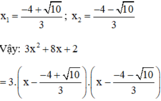Hãy nhập câu hỏi của bạn vào đây, nếu là tài khoản VIP, bạn sẽ được ưu tiên trả lời.

\(3x^3-7x^2+17x-5=3x^3-x^2-6x^2+2x+15x-5\)
\(=x^2\left(3x-1\right)-2x\left(3x-1\right)+5\left(3x-1\right)\)
\(=\left(3x-1\right)\left(x^2-2x+5\right)\)
\(x^3-x^2-4=x^3+x^2+2x-2x^2-2x-4\)
\(=x\left(x^2+x+2\right)=2\left(x^2+x+2\right)=\left(x-2\right)\left(x^2+x+2\right)\)

4x^2 - 7x -2 = 4x^2 - 8x + x - 2 = 4x(x - 2) + (x - 2) = (x -2)(4x + 1)

a) Đặt \(x^2=a\left(a\ge0\right)\)
Ta có: \(2x^4-7x^2+4=0\)
Suy ra: \(2a^2-7a+4=0\)
\(\Delta=49-4\cdot2\cdot4=49-32=17\)
Vì \(\Delta>0\) nên phương trình có hai nghiệm phân biệt là:
\(\left\{{}\begin{matrix}a_1=\dfrac{7-\sqrt{17}}{4}\left(nhận\right)\\a_2=\dfrac{-7+\sqrt{17}}{4}\left(loại\right)\end{matrix}\right.\)
Suy ra: \(x^2=\dfrac{7-\sqrt{17}}{4}\)
\(\Leftrightarrow x=\pm\dfrac{\sqrt{7-\sqrt{17}}}{2}\)
Vậy: \(S=\left\{\dfrac{\sqrt{7-\sqrt{17}}}{2};-\dfrac{\sqrt{7-\sqrt{17}}}{2}\right\}\)

Ta có A(x) chia cho B(x) có số dư là 5
=> A(x) = C(x). (x+3) + 5
=> A(-3) = 5 => (-3)3 + 2.(-3)2 + (-3) + 2 - m=5
=>(-10) - m =0 => m = -10

* Chứng minh:
Phương trình a x 2 + b x + c = 0 có hai nghiệm x 1 ; x 2
⇒ Theo định lý Vi-et: 
Khi đó : a.(x – x1).(x – x2)
= a.(x2 – x1.x – x2.x + x1.x2)
= a.x2 – a.x.(x1 + x2) + a.x1.x2
= 
= a . x 2 + b x + c ( đ p c m ) .
* Áp dụng:
a) 2 x 2 – 5 x + 3 = 0
Có a = 2; b = -5; c = 3
⇒ a + b + c = 2 – 5 + 3 = 0
⇒ Phương trình có hai nghiệm 
Vậy: 
b) 3 x 2 + 8 x + 2 = 0
Có a = 3; b' = 4; c = 2
⇒ Δ ’ = 4 2 – 2 . 3 = 10 > 0
⇒ Phương trình có hai nghiệm phân biệt:



\(x^2-x+1-m=0\left(1\right)\\ \text{PT có 2 nghiệm }x_1,x_2\\ \Leftrightarrow\Delta=1-4\left(1-m\right)\ge0\\ \Leftrightarrow4m-3\ge0\Leftrightarrow m\ge\dfrac{3}{4}\\ \text{Vi-ét: }\left\{{}\begin{matrix}x_1+x_2=1\\x_1x_2=1-m\end{matrix}\right.\\ \text{Ta có }5\left(\dfrac{1}{x_1}+\dfrac{1}{x_2}\right)-x_1x_2+4=0\\ \Leftrightarrow5\cdot\dfrac{x_1+x_2}{x_1x_2}-x_1x_2+4=0\\ \Leftrightarrow\dfrac{5}{1-m}+m-1+4=0\\ \Leftrightarrow\dfrac{5}{1-m}+m+3=0\\ \Leftrightarrow5+\left(1-m\right)\left(m+3\right)=0\\ \Leftrightarrow m^2+2m-8=0\\ \Leftrightarrow m^2-2m+4m-8=0\\ \Leftrightarrow\left(m-2\right)\left(m+4\right)=0\\ \Leftrightarrow\left[{}\begin{matrix}m=2\left(n\right)\\m=-4\left(l\right)\end{matrix}\right.\)
Vậy $m=2$